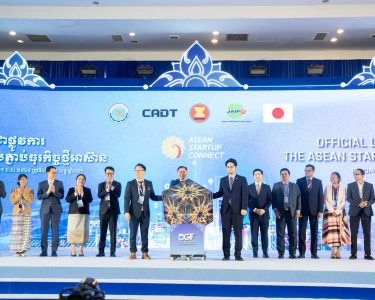Cambodia Entrepreneurship Day 2025 commenced in Phnom Penh on November 14 with a clear message: entrepreneurs are increasingly viewed as the backbone of national market stability and the key to restoring business confidence amid shifting economic conditions. Held under the theme “Vision 2030: Invest for the Future,” the event was co-organized by the Young Entrepreneurs Association of Cambodia (YEAC) and the Global Entrepreneurship Network Cambodia, bringing together around 300 founders, investors and policymakers to assess Cambodia’s next chapter of economic transformation.
Entrepreneurs seen as stabilizing force amid supply-chain uncertainty
Discussions centered on recent supply-chain disruptions caused by tensions at the Cambodia–Thailand border and Thailand’s unilateral border closures, which have impacted manufacturing, logistics and consumer supply. Government leaders noted that when international trade flows become unpredictable, domestic entrepreneurs have shown the capacity to adapt rapidly, expand operations and sustain product availability across key markets.
Read More: Khmer Can Do Exhibition Highlights Cambodia’s Rising Entrepreneurial Spirit
Policymakers pointed to real-time examples across manufacturing, food processing, logistics, agriculture and digital services where Cambodian entrepreneurs have stepped in to offset regional volatility. The role of domestic producers in maintaining supply to factories and retail channels was spotlighted as a defining strength of the entrepreneurial community.

Push for formalization, technology adoption and capital access
Beyond resilience, the event also examined the structural challenges that prevent local firms from scaling. Speakers emphasized that long-term economic success will depend not only on grit and adaptability but also on formalizing operations, strengthening financial records, and putting governance systems in place to build investor trust.
Technology investment was another major theme, with businesses encouraged to integrate digital solutions that improve efficiency and allow products and services to compete across borders. Both government assistance programs and financial-sector mechanisms were highlighted as underutilized avenues for supporting entrepreneurial growth, especially when accessing capital to expand production capacity.
Confidence deficit and the path to 2029 LDC graduation
A recurring concern discussed at the event was what is being described as a “confidence deficit” in the Cambodian market — hesitation among investors and business leaders with capital to deploy funds into new ventures, even when viable teams and opportunities exist. Policymakers emphasized that restoring confidence will be as crucial as attracting new investment flows, particularly as Cambodia approaches a decisive milestone.
The Kingdom is on track to graduate from Least Developed Country (LDC) status by the end of 2029. According to economic leaders at the conference, the strength and scalability of local enterprises will be pivotal not only to securing a smooth transition but also to ensuring that Cambodia avoids stagnation in the middle-income trap in the decade ahead.
Speakers concluded that a more diversified and innovation-driven private sector will be essential for the country to progress from a consumption-focused economy to one that designs, produces, packages and exports competitively at regional and global levels.
The event continues with panel discussions and networking sessions aimed at accelerating partnerships between entrepreneurship platforms, financial institutions, development partners and private investors seeking scalable opportunities in the Cambodian market.





